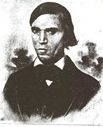Amos C. Dayton (1811-1865), a popular Baptist pastor and advocate of Landmarkism, this month offers his answer to the Southern question of, “Is God on Our Side?” Regarding African slavery, the Confederacy is clearly on God’s side, according to Dayton. But on certain issues of government holiness and purity, the South needs to align itself more with the word of God, according to the pastor.
In conversation … with a dear brother in the Lord, I was much impressed with a remark which he made. Said he, “We hear much about God’s being on our side but I can’t find in the Bible any evidence that God takes sides with any man. We may be on God’s side, but God does not come upon our side.–If we will have His aid and cooperation we must go to Him and not wait for Him to come to us. This is the way and the only way to have God on our side. We must arrange ourselves upon His side.”
There is a volume of inspired truth in this, but are we as a nation on God’s side? So far as the existence of the institution of slavery is concerned we are, for that is expressly provided for and sanctioned in his word. So far as drunkenness among our people and in our army is concerned we are past taking sides with Him if we have not already done so.
So far as regards profane swearing, our government is on His side, for in the articles of war it expressly forbids profanity among the soldiers, although the prohibition is solely disregarded by both officers and men.
But there is one particular in which our government is not on God’s side, there is one thing in which it is against Him, in which it openly and defiantly opposes Him–there is one law of God which it requires of its officers and its soldiers that they shall disregard. There is one law of God no less binding than those forbiding drunkenness or profanity, lying or theft or murder, which our government not only disregards itself but demands by law and under the sanction of heavy penalties that our citizens shall violate. That is the law which says: “Remember the sabbath day to keep it holy.”–
“Six days may work be done, but the seventh is the Sabbath of rest. In it ye shall do no work.” This is what God says. But our Government says to every officer in the Post Office Department, Ye shall not heed this law of God. Ye shall do all the work that is required to make up, forward and deliver the mails upon the Sabbath, just as on any other day; and if you will obey God rather than us, you shall be dismissed from office as an unworthy citizen.
And in the war department it says, if not by law, at least by the orders of certain of its officers to our soldiers, Ye shall drill and parade, and labor on entrenchments on the Sabbath, just as though there were no law of God, and if you refuse to obey these orders, you are liable to be shot as mutinous soldiers. They can’t obey God without rebellion against their officers acting under the authority and sustained by the power of the Confederate Government.
Yet we call upon God to take sides with us. Our Government appoints fast days and days of prayer to secure his co-operation in our great struggle. Let it come over to God’s side. Let it take part with Him against this sin, and then we can pray with confidence.–Then God is for us, because we are for Him.
Our Government will do it when it has considered the case. It inherited the sin from our fathers, and has not been made conscious of its enormity. Let Christians in every corner of our land cry out to it for reformation in this thing. Let us petition and remonstrate till it hears and heeds the voice of the people, which, in this, at least, will be the voice of God. We can have God on our side, and if God be for us, who can be against us?
Datyon’s words signal a sea change in Baptist life in the South. Prior to the war, Baptists North and South were the most vocal Christian voices (and largely the only Christian voices) for the government not treating Sunday as a special day. These pre-war Baptists rejected the idea of America as a Christian nation, fought for church state separation and religious liberty for all, and specifically advocated for the continuation of the custom of Sunday mail delivery, arguing that the government had no business recognizing any holy day.
Yet with the formation of the Confederate States of America, many white Baptists of the South abandon their faith heritage of church state separation, convinced that the slave-based Confederacy is God’s chosen nation. Thus, Dayton, while straying far from his faith heritage, is far from alone in his strong Christian nationalist sentiments during the war years.
Source: A. C. Dayton, “Is God on Our Side?”, Christian Index, June 17, 1862; more about Amos C. Dayton (link); Louis Keith Harper, “Old Landmarkism: A Historiographical Appraisal,” Baptist History & Heritage Journal, Vol. 25, April 1990 (link); image (link)



